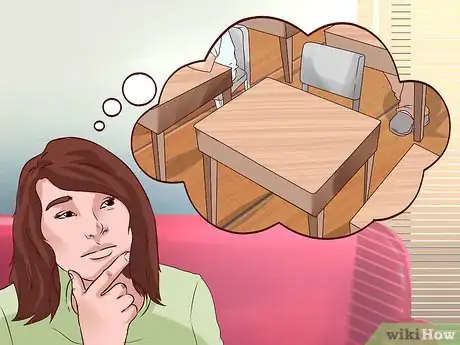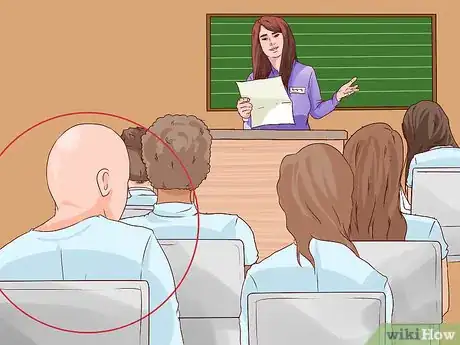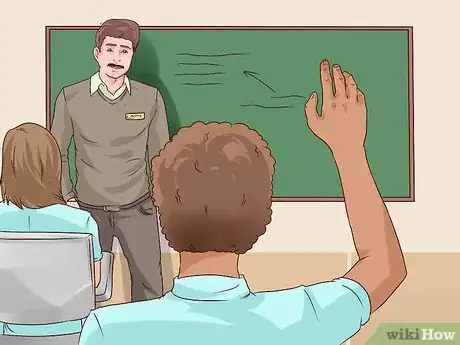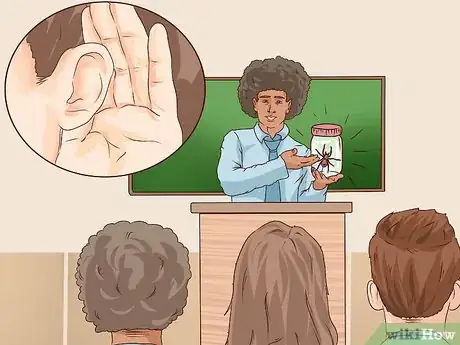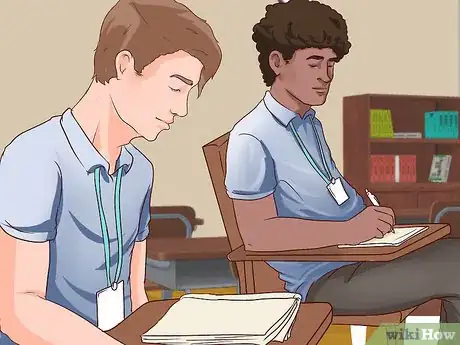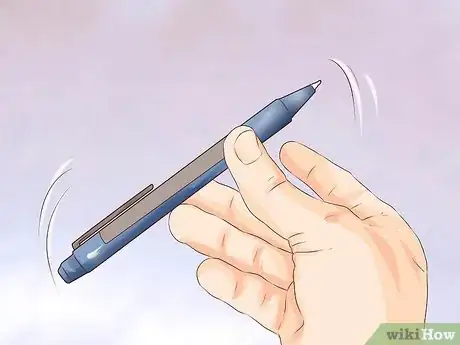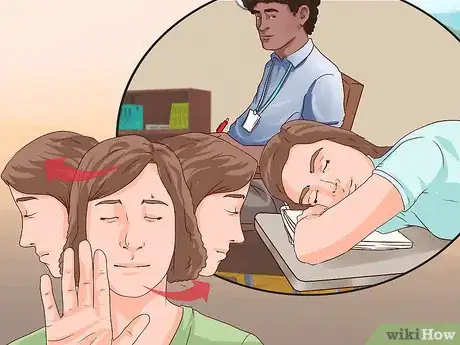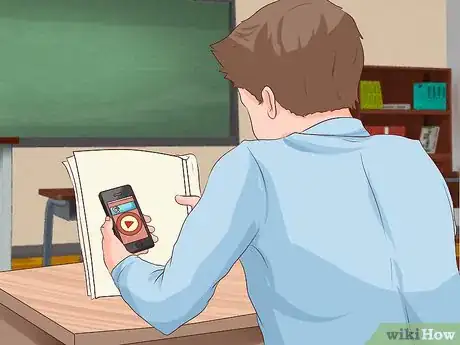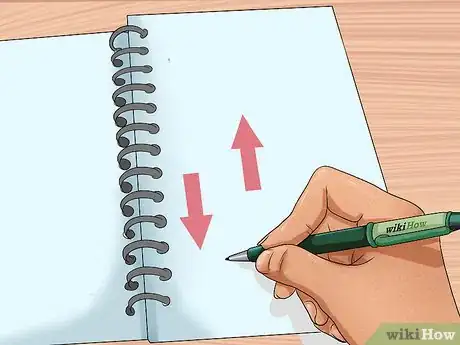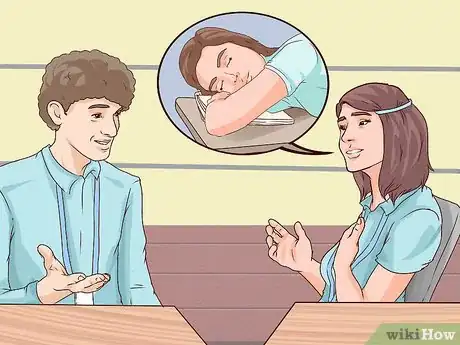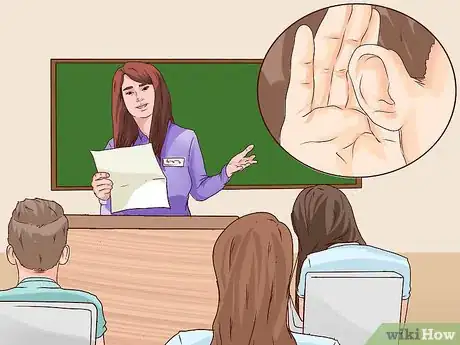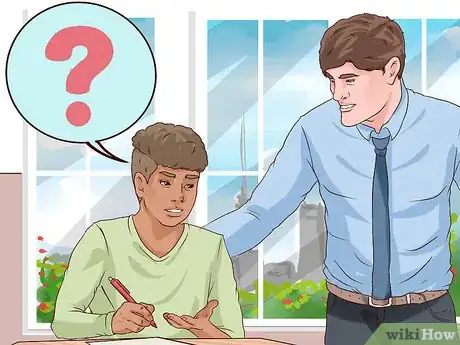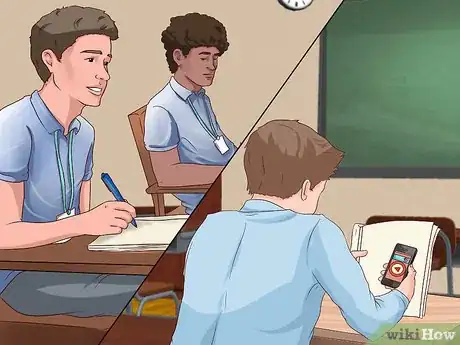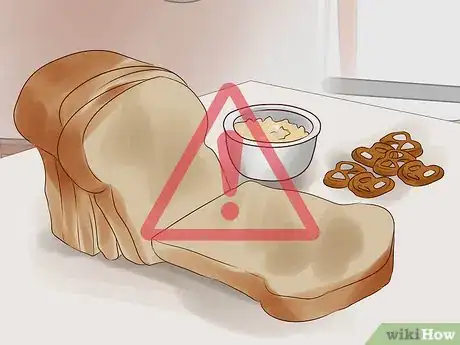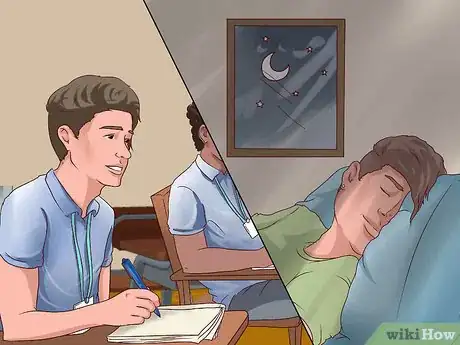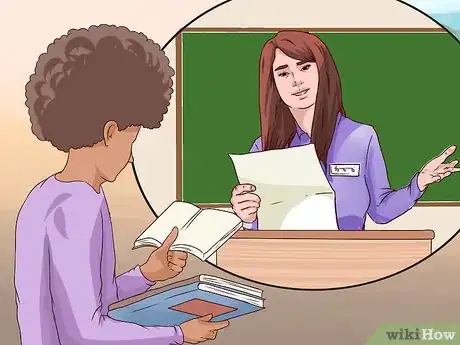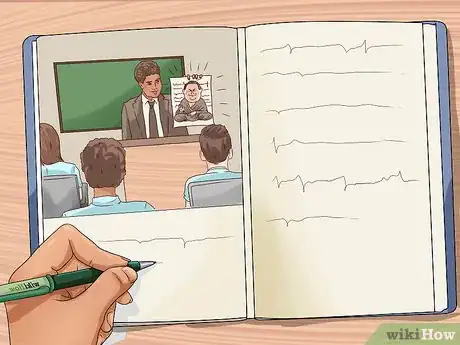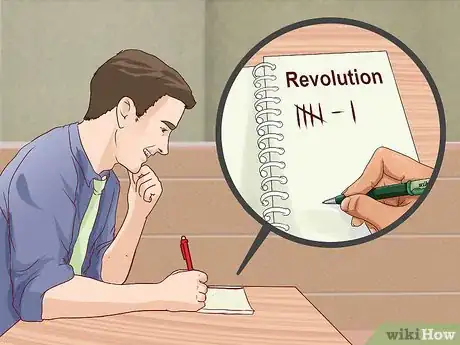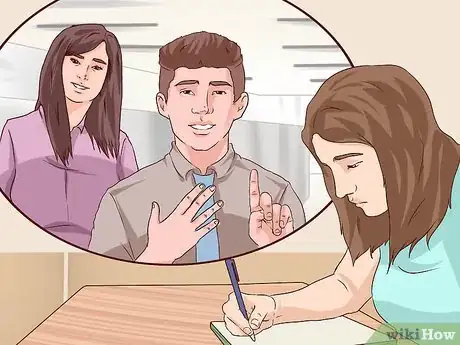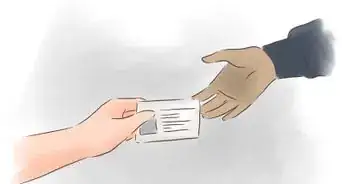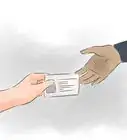wikiHow is a “wiki,” similar to Wikipedia, which means that many of our articles are co-written by multiple authors. To create this article, 30 people, some anonymous, worked to edit and improve it over time.
This article has been viewed 53,072 times.
Learn more...
Everyone’s mind wanders sometimes and paying attention in class, especially during subjects you don’t find interesting, can be tedious. What to do? Take a brain vacation! Letting your mind wander or relax unconsciously (zoning out), can give you the space you need to get through those long, painful classes.[1] In this article, we'll show you how to carefully plan your zone out session so your teacher doesn't catch you. We'll also cover some tips that can help you focus better in class if zoning out doesn't work.
Steps
Planning the Zone-Out Session
-
1Decide carefully when to zone out. If you zone out during a presentation or a time when you’re expected to speak in class, your cover will be blown. If, on the other hand, you zone out during someone else’s presentation, or on a day when the class sees a film, you’ll be far more likely to successfully zone out without getting caught.
-
2Sit away from the teacher. A seat far from the teacher is a good place to zone out for two reasons. First, it will provide crucial distance between you and anything which might disrupt your thought vacation. Second, it will reduce the chances of you being discovered for zoning out. If you’re using an electronic device to block out the teacher’s lecture, you’re less likely to be caught when you’re not sitting front and center in the teacher’s line of sight.Advertisement
-
3Ask or answer a question early in the class. When you show that you are engaged, the teacher will be less likely to call on you again. Asking or answering a question before you zone out will ensure you earn your requisite participation points with the teacher while limiting the likelihood he or she will expect more of you later.
-
4Listen to your teacher. This seems counterintuitive: how can you zone out when you’re paying attention? But if the class is so boring that you’d dig up an article online about how to zone out and get away with it, chances are that you’re stuck in a truly boring class. Listening to a few minutes of your teacher drone on about binomial fractions or Wuthering Heights is sure to numb your brain enough to allow the zoning-out process to spontaneously take over.
Getting Relaxed
-
1Rest your eyes. Reduce your rate of blinking. Don’t close your eyes or you might fall asleep, but don’t focus your eyes on anything in particular. You can look at your desk, your book, or the floor. Imagine you’re staring through the object directly in front of you. If you wear glasses, remove them. Give your eyes a gentle rub before zoning out.
-
2Get comfortable. Lean back against your chair. Plant both feet on the floor. If possible, remove your shoes. If you’re wearing a constricting tie or jacket, loosen or remove it. Breathe in slowly and evenly, inhaling through your nose.
-
3Engage in a simple, repetitive motion. For instance, you might roll a marble back and forth between your thumb and index finger. Or you might wiggle a pen or pencil rapidly in your hand using the same fingers. Using an object in this way can help you concentrate on your personal daydreams or fantasy.
-
4Don’t try to focus. Trying to fight a daydream or a zoned-out feeling by shaking your head, arching your eyebrows up and opening your eyes wider, or rubbing your face or eyes vigorously in an attempt to “snap out of it” will draw attention to your efforts. Instead, let yourself return from the period of zoning out naturally. Return from your zone-out session slowly.
-
5Let your mind wander. Thinking about things you’ll be doing later when you’re out of class, or things you did yesterday are some of the easiest things to daydream about.[2] Alternately, you could imagine yourself in an exciting adventure with wizards, monsters, and/or space aliens. Don't smile or show any emotion to the imaginary visions you're seeing or you might get caught.
-
6Distract yourself. It’s easy to become immersed in a good e-book, or a show. A simple classic like solitaire, pong, or chess is available on almost every laptop. Newer games with 3-D graphics and lots of exciting action are good choices too if you turn the volume off. Any entertaining distraction can help you zone out and ignore what’s going on around you.
- Be careful not to let your teacher see you using these devices in class; you’re likely to have them taken away.
-
7“Write” in your notebook. Don’t write words or take notes, just move your pencil or pen up and down with its tip suspended just above the page. Stare at the page but do not focus on it. Unless your teacher is paying close attention to you, the movement of the pen up and down across the page is likely to fool them into believing you are actively engaged in note-taking. This is a good way to zone out without getting caught.
-
8Focus on a point in front of you. It could be on the desk, on the floor, or on your book. Keep your eyes on that spot but relax your eyes. Looking at a nearby object in a natural way will prevent you from getting caught zoning out.
- Pretend you’re reading the book. Stare intently at the book in front of you. Your teacher will think you’re reading or reviewing material relevant to the lecture, but you’re really just using the book as a zero point.
-
9Have a friend act as a lookout. Tell your friend “Hey, I’m going to zone out for a few minutes. Please let me know if I should be doing something or if I miss something important.” Begin your zone-out session. After you come back, thank your friend for his or her help. Copy the notes they took in the last few minutes while you were mentally checked out.
-
10Listen for key words. If your teacher has words or phrases he or she frequently uses like "Got it?" or "Understand?", you can listen for them and mentally drop out until you hear them. When people are hypnotized, the hypnotist always plants a wake-up cue in their minds so they will not be hypnotized forever. Usually, they use a small bell to wake their subjects up. Think of your teacher’s catchphrase(s) as your little bell. Limiting your zone-out time and returning to attention in this way will ensure you don't get caught.
-
11Offer vague answers. If your teacher suspects you’re drifting off into your own private world, you might be called on to answer a question. Reply with answers that could plausibly be those of a fully engaged student. “Could you please repeat the question?” and “I’m not sure” are both acceptable, though your teacher might be upset at your inability to proffer the correct answer.
- If your teacher asks if you’re listening to him or her, apologize but deny zoning out. Say instead that you were thinking about what had just been said. This can be risky, since your teacher may then follow up on your comment and ask you to relay what they just said, or your thoughts about it.
-
12Balance zoning out and paying attention. Don’t zone out during the entirety of your class. Only zone out for as much time you need to feel refreshed and relaxed. If you zone out the entire time you’re in class, the odds that you’ll be caught by your teacher increase dramatically. Plus, you’re likely to miss something that you might need to know later.
Adopting Alternatives to Zoning Out
-
1Avoid eating a heavy carb load before class. Carbs provide fuel for your body, especially when you’re engaged in athletic events requiring endurance. While it’s a good idea to load up on carbs before engaging in physical activity, doing so before class can lead to postprandial somnolence, better known as a food coma. A food coma is the feeling of drowsiness following a meal with lots of carbs.
- Carbohydrates in foods with a high glycemic index like snacking crackers, cookies, and soda are more easily digested than foods with a lower glycemic index, and leads easily to exhaustion and sleepiness.[3]
- A balanced meal of fruits, vegetables, and whole grains is the best option to stay alert during class.
-
2Come to class well rested. Failing to get adequate sleep can lead to deficits in energy, motivation, and concentration.[4] You will be more easily distracted and less likely to remember what was talked about or covered in class if you have not gotten at least 6-8 hours of sleep each night. Set a regular bedtime for yourself which enables you to obtain the requisite amount of sleep. If you wake at 6, for instance, tuck into bed around 10 the night before.
-
3Read the material being covered in class. If you read the material which will be covered in class the night before you go, you’ll have a better time keeping up with what the teacher is talking about. Use your reading to come up with some questions to ask in class. Coming into a class with some background knowledge will help you better connect with the new material presented in the lecture.
-
4Find at least one interesting thing in the course material for the day. As you take notes, if anything surprises you or makes you laugh, put a star by it. This will help improve your recall later and make the class more enjoyable. It’s always more fun to be in a class where you find at least something of interest than it is to be in a class where everything is boring. Listening and looking actively for an interesting tidbit will keep you alert and engaged.
-
5Make a game out of listening for keywords from the teacher. For instance, if the class is about the American Revolution, count the number of times you hear the word “Revolution.” Each time you hear it, put a small tally at the top corner of your notebook. Listening actively and being engaged in what the teacher is saying will keep you focused and prevent you from zoning out.
-
6Count how many students say something in class. Each time a student speaks, make a note of what they asked and what the answer was. Paying attention to what your classmates say can be a good source of information. Oftentimes, a teacher will address interesting and significant information in response to a student’s question. Paying attention to your peers’ comments and questions is not only respectful, but it can increase your attention on the class as a whole.
Community Q&A
-
QuestionMy teacher is annoying and rude, but I am her favorite student. What should I do?
 Community AnswerMaybe you could approach her before or after class and calmly discuss what she's doing that bothers you. This would only be appropriate if whatever she's doing has some relevance to her teaching style, though. If you just find her personally annoying, you will just have to put up with it.
Community AnswerMaybe you could approach her before or after class and calmly discuss what she's doing that bothers you. This would only be appropriate if whatever she's doing has some relevance to her teaching style, though. If you just find her personally annoying, you will just have to put up with it.
Warnings
- Don't let your eyes close, or you might fall asleep.⧼thumbs_response⧽
- Don't let your teacher catch you or you’ll get in trouble.⧼thumbs_response⧽
- Keep zoning out, and you might miss something very important like, “Your test is tomorrow.” Don’t make a habit of zoning out in a particular class.⧼thumbs_response⧽
References
- ↑ http://discovermagazine.com/2009/jul-aug/15-brain-stop-paying-attention-zoning-out-crucial-mental-state
- ↑ https://www.psychologytoday.com/articles/200903/devoted-distraction?collection=59974
- ↑ http://articles.chicagotribune.com/2013-08-07/features/ct-x-0807-expert-school-food-20130807_1_peanut-butter-protein-breakfast
- ↑ http://www.aasmnet.org/resources/factsheets/sleepdeprivation.pdf
